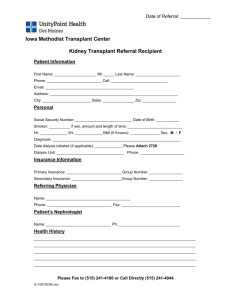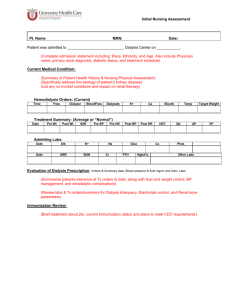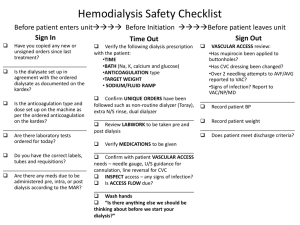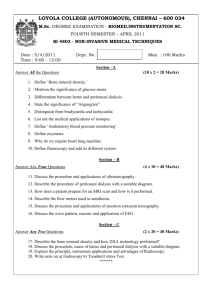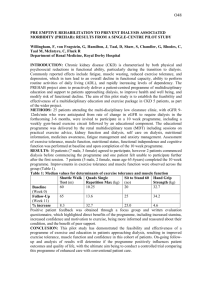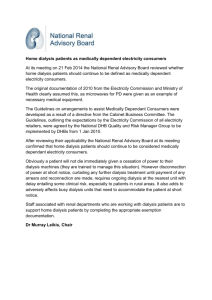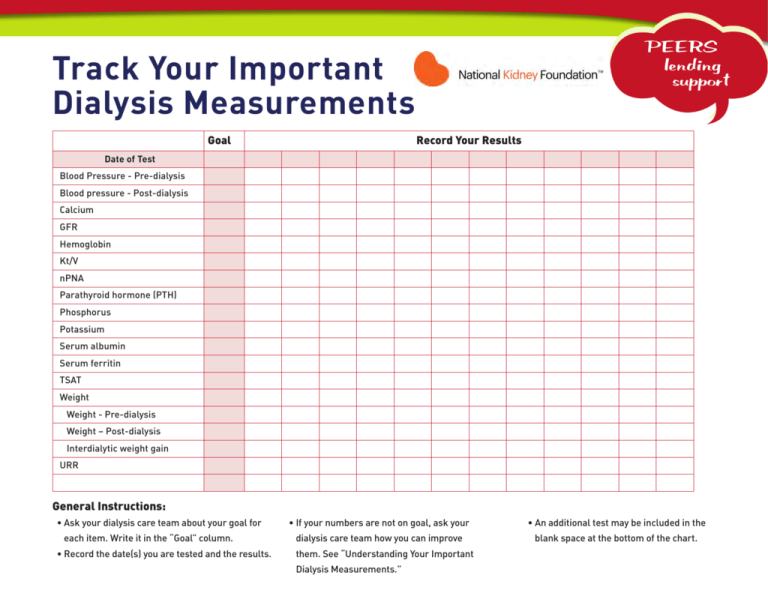
peers
lending
support
Track Your Important
Dialysis Measurements
Goal
Record Your Results
Date of Test
Blood Pressure - Pre-dialysis
Blood pressure - Post-dialysis
Calcium
GFR
Hemoglobin
Kt/V
nPNA
Parathyroid hormone (PTH)
Phosphorus
Potassium
Serum albumin
Serum ferritin
TSAT
Weight
Weight - Pre-dialysis
Weight – Post-dialysis
Interdialytic weight gain
URR
General Instructions:
• Ask your dialysis care team about your goal for
each item. Write it in the “Goal” column.
• Record the date(s) you are tested and the results.
• I f your numbers are not on goal, ask your
• An additional test may be included in the
dialysis care team how you can improve
blank space at the bottom of the chart.
them. See “Understanding Your Important
Dialysis Measurements.”
Understanding Your Important
Dialysis Measurements
The following tests may be done to check your
nutrition and general health while on dialysis. Ask
Calcium:
your doctor and dialysis care team which tests you
Calcium is a mineral in the blood that is important
will have and how often they will be done. If your
for strong bones and teeth. People on dialysis often
numbers are not at goal, ask how to improve them.
develop problems with their bones due to abnormal
Blood Pressure:
Page 2
calcium levels.
pushing against the walls of your blood vessels.
Glomerular Filtration Rate
(GFR):
High blood pressure happens when the pressure in-
Your GFR is an estimate of how much kidney function
creases enough to cause damage. The goal for most
you have. Your GFR is calculated from the results of a
people on dialysis is less than 130/90. Pre-dialysis
simple blood test, your age, gender, and race.
Blood pressure measures the force of your blood
and post-dialysis blood pressure should be taken
each time you receive dialysis treatments. Your
blood pressure decreases when extra fluid and salt
are filtered out of your blood by dialysis.
Hemoglobin:
Hemoglobin is the part of red blood cells that
carries oxygen from your lungs to all the tissues in
your body. If your hemoglobin is too low, you have
anemia. Anemia can make you feel tired and have
little energy. Many people on dialysis have anemia.
Understanding Your Important Dialysis Measurements, continued
Testing your hemoglobin levels helps your healthcare provider know whether you need treatment
Page 3
nPNA:
for anemia. It also helps determine how well your
Your nPNA (normalized Protein Nitrogen Appear-
anemia treatment is working.
ance) is a test that may tell if you are eating enough
Iron:
TSAT and Serum Ferritin:
Your TSAT and serum ferritin are measures of iron
in your body. Iron helps your body build red blood
cells, which is important in treating anemia. Testing
your TSAT and serum ferritin helps your healthcare
protein. This measurement comes from lab studies
that include urine collection and blood work. Your
dietitian may ask for an accurate food record to go
with this test.
Parathyroid Hormone
(PTH):
physician determine whether you have enough iron
Your PTH level gives information about your mineral
for building red blood cells.
and bone health status. A high level of parathyroid
Kt/V:
Kt/V (pronounced “kay tee over vee”) is a measure
of the amount of dialysis you receive. Getting the
right amount of dialysis is important to your overall
health and can also affect how well you eat. This test
helps your healthcare professional know if you are
getting the right amount of dialysis.
©2011 National Kidney Foundation, Inc. All rights reserved. 01-10-4196_EBB
hormone (PTH) may result from an abnormal
balance of calcium and phosphorus in your blood.
Testing your PTH level is important because it
helps you know whether you have mineral and bone
disorder and need treatment for it. It also shows
how well your treatment is working.
Understanding Your Important Dialysis Measurements, continued
Page 4
Phosphorus:
may lead to health problems, such as difficulty fight-
Phosphorus is a mineral in the blood that is essen-
right amount of protein and calories from your diet.
tial to keep cells and bones healthy. Kidneys keep
your blood phosphorus level in balance. A high
phosphorus level can lead to weak bones. People
with kidney disease need to have their phosphorus
levels monitored so imbalances can be treated early.
Potassium:
Potassium is a mineral in the blood that helps your
heart and muscles work properly. Kidneys are essential
to keeping blood potassium levels in balance. A
potassium level that is too high (hyperkalemia) or
ing off infections. Ask your dietitian how to get the
Urea Reduction Ratio (URR):
URR is another measure of how well your dialysis
treatments are working to clear wastes from your
blood. It uses blood tests but does not include urine
collection. Your target URR should be 65 percent
or higher.
Weight:
Body Weight
too low (hypokalemia) can be harmful and needs to
Maintaining a healthy weight is important to your
be treated to bring the level to normal range.
overall health. You should check your weight at
Serum Albumin:
Albumin is a type of protein made from the protein
home every morning. Speak to your doctor if your
weight changes suddenly.
Target Weight (or dry weight)
you eat each day. A low level of albumin in your
Target weight is how much you should weigh after
blood may be caused by not getting enough protein
dialysis removes excess fluid from your body.
and calories from your diet. A low level of albumin
Understanding Your Important Dialysis Measurements, continued
Interdialytic Weight Gain
Page 5
other problems from getting worse. There are two
This is the amount of weight you gain each day
ways to monitor your blood glucose. The first is with
between dialysis treatments. If you do not follow
a blood glucose meter. This is a simple test that you
your fluid and salt limits between treatments, you
do yourself usually several times a day. It tells you
may gain too much fluid weight.
what your blood sugar is at any moment in the day.
Other Tests You May Have
In addition to the tests you have regularly to check
The other way is with an A1C test.
Creatinine Clearance:
your health on dialysis, you may have some of the
Creatinine clearance is another measure of how well
following tests.
your dialysis clears wastes from your blood. Your
A1C:
This is a simple blood test that is used to diagnose
diabetes and then to gauge how well you are managing your diabetes. It tells you what your average
blood sugar level is for the past two to three months.
Blood Glucose:
If you have diabetes, keeping your blood glucose
(blood sugar) level well controlled is important.
Good control helps keep chronic kidney disease and
dialysis care team will check your weekly creatinine
clearance about once every four months to make
sure you are getting the right amount of dialysis.
Understanding Your Important Dialysis Measurements, continued
Cholesterol:
Total Cholesterol
Page 6
Serum Creatinine:
Creatinine is a waste product in your blood that
Cholesterol is a fat-like substance found in your
comes from the normal function of your muscles.
blood. A high cholesterol level may increase your
Healthy kidneys remove creatinine from your
risk of having heart and circulation problems. How-
blood, but when the kidneys are not working, your
ever, a cholesterol level that is too low may mean you
creatinine level rises. Your dialysis also removes
are not eating well enough to stay healthy. Ask your
creatinine from your blood. Not getting enough
doctor if your cholesterol level is in the right range.
dialysis can cause your creatinine level to rise,
HDL Cholesterol
HDL cholesterol is a type of “good” cholesterol that
protects your heart.
LDL Cholesterol
LDL cholesterol is a type of “bad” cholesterol. A high
LDL level may increase your chance of having heart
and circulation problems.
Triglyceride:
while getting more dialysis causes it to fall.
Subjective Global
Assessment (SGA):
Your dietitian may use SGA to help check for signs
of nutrition problems. The dietitian will ask you
some questions about your daily diet and check your
weight and the fat and muscle stores in your face,
hands, arms, shoulders and legs. Ask your dietitian
Triglyceride is another type of fat found in your
about your score on the SGA. If your score is too low,
blood. A high triglyceride level, along with high lev-
ask how to improve it.
els of total and LDL cholesterol, may increase your
chance of having heart and circulation problems.
©2011 National Kidney Foundation, Inc. All rights reserved. 01-10-4196_EBB

